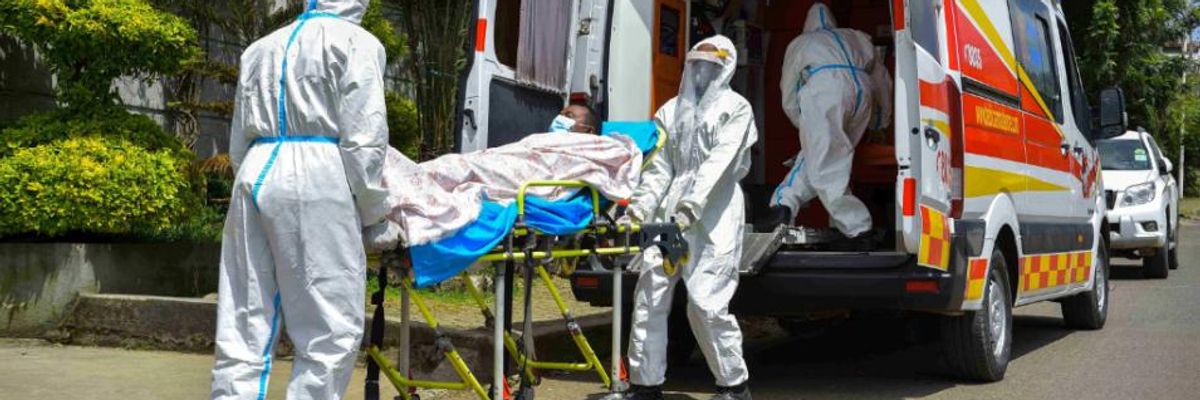Months after more than 150 countries joined the Covid-19 Vaccines Global Access Facility, or COVAX, with the aim of ensuring rich countries finance vaccine distribution to poor nations in order to bring an end to the coronavirus pandemic, global public health officials fear that the push for international solidarity "has mostly been lost" as the U.S., Canada, and Western Europe has claimed a vast majority of the available vaccines.
Under the Trump administration, as Common Dreams has reported, the U.S. is one of a few wealthy countries that have not pledged to support COVAX. At the same time, the U.S. government has spent billions of dollars to research and develop the vaccine introduced by Pfizer, which was administered to American healthcare workers for the first time on Monday, and one created by Moderna, which a panel of experts will advise the Food and Drug Administration on regarding approval this week.
"The worst possible outcome is you're offering vaccines to a whole country's population before we're able to offer it to the highest-risk ones in other countries."
--Dr. Bruce Aylward, WHO
The U.S. has secured 100 million doses of Pfizer's vaccine and 200 million of Moderna's. The country has been offered the option to buy a total of 800 million more doses of the two vaccines and has also preordered more than 800 million vaccine treatments that have yet to be licensed by regulatory agencies, including those being developed by AstraZeneca, Johnson & Johnson, Novavax, and Sanofi.
According to a New York Times analysis published Tuesday, the U.S. has ensured it has access to enough vaccine doses to inoculate nearly 200% of its population. With the additional doses it's been offered, the U.S. could vaccinate every person in the country four times over. Canada, meanwhile, has ordered enough to vaccinate about 500% of Canadian residents.
The COVAX facility, meanwhile, hopes to purchase two billion doses of vaccines over the next year but has been able to secure only 200 million for dozens of developing countries. The disparity means that people in wealthy countries who are statistically less likely to develop severe Covid-19 infections will be vaccinated months before vulnerable populations in poor countries.
"The worst possible outcome is you're offering vaccines to a whole country's population before we're able to offer it to the highest-risk ones in other countries," Dr. Bruce Aylward, a senior adviser to WHO director-general Dr. Tedros Adhanom Ghebreyesus, told the Times.
That scenario presents a "moral issue," John Nkengasong, director of the Africa Centers for Disease Control and Prevention, told the Associated Press on Tuesday.
The U.S., Canada, and European countries are buying vaccines "in excess of their needs while we in Africa are still struggling with the COVAX [effort]," he told the outlet.
In addition to the 200 million doses COVAX has legally binding agreements for, the facility has agreements with pharmaceutical companies to potentially purchase 500 million more. Those deals are not legally binding, though, and COVAX is running low on funding despite a pledge from the G20 countries last month to "spare no effort" in ensuring poor countries have sufficient access to vaccines.
The vaccines COVAX has reached agreements on were developed by AstraZeneca and Novovax, which would still need WHO approval in order to be distributed. The facility has not secured access to the two vaccines farthest along in the approval process.
"COVAX has not secured enough doses, and the way the situation may unfold is they will probably only get these doses fairly late," Arnaud Bernaert, head of global health at the World Economic Forum, told the AP.
According to the Times' analysis, poor countries including Nepal, Uzbekistan, and Egypt will have the ability to vaccinate about half their populations in 2021, as distribution plans currently stand. Moldova and Bangladesh will only be able to vaccinate tiny fractions of their populations, potentially allowing the virus to run rampant after wealthy countries gain control of their outbreaks.
"The difference between people in rich countries getting vaccinated and the lack of any vaccines for the developing world will become quite stark," Anna Marriott, health policy manager at Oxfam, which is part of the global network People's Vaccine Alliance, told the AP. "And it will only prolong the pandemic."
"Unless something changes dramatically, billions of people around the world will not receive a safe and effective vaccine for Covid-19 for years to come," Marriott added in an interview with the BBC last week.
Public Citizen, which along with the governments of South Africa and India has pushed the World Trade Organization to suspend intellectual property rights for Covid-19 vaccines, allowing countries to develop generic versions, said last week that poor countries' upcoming struggle to protect their populations while people in the U.S., Canada, the U.K., and other wealthy countries begin to see a way out of the pandemic, "is going widely unreported."
"We are on the verge of global vaccine apartheid," Public Citizen said.




